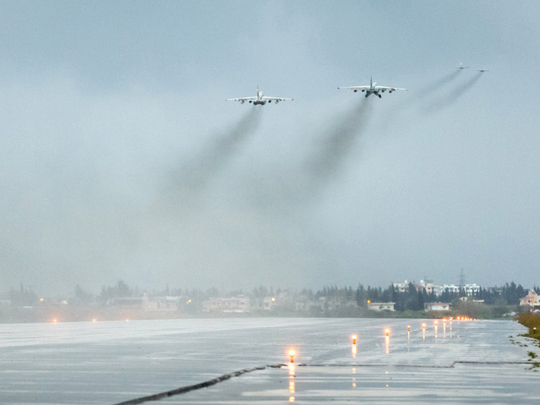
Beirut: The killing of Mustafa Badr Al Deen and at least 80 other Shiite fighters backing Bashar Al Assad’s regime in Syria has made international headlines this week.
People are asking why so many Shiite militiamen have been dying in Syria recently.
Labib Kamhawi, an analyst based in Jordan, attributed the deaths to competition between Russia and Iran for influence over Al Assad. Last year, Moscow intervened militarily against opponents of the Syrian leader and has seen its influence in the country rise at the expense of Iran’s, Kamhawi said.
In March, Russia ordered a partial drawdown of its forces in Syria but continues to launch air strikes at government opponents.
“Russia has reduced its air strikes Syria, and so all those Iranians are getting killed because of a lack of air cover,” Kamhawi said. “This seems to be part of a Russian strategy to marginalise Iran’s role in Syria and make its influence unparalleled.”
The announcement Saturday, by Lebanon’s Hezbollah militia blaming the recent killing of a militant described as its top commander in Syria on extremist Syrian rebels, was a surprise. Many expected the powerful Shiite group to point a finger at its traditional nemesis, Israel.
Hezbollah revealed a day earlier that Badr Al Deen, one of its most senior figures, died in a mysterious blast in Damascus, the Syrian capital. Before leading thousands of militants in Syria, Badr Al Deen, 55, is suspected of having roles in the assassination of a Lebanese prime minister in 2005, and other bombings that date to the attack on the US Marine barracks in Beirut in 1983.
Hezbollah uses “takfiri,” an Arabic word, to describe extremist Sunni groups, including Al Qaida and Daesh.
Hezbollah didn’t specify which group killed Badr Al Deen or when he died.
But the Syrian Observatory for Human Rights, a Britain-based monitoring group, said there has been no shelling for a more than a week in the area where Hezbollah said Badr Al Deen was killed, Reuters reported.
If Hezbollah had blamed Israel for his death, the group would have come under pressure to launch a tough retaliation that, in turn, would risk triggering war. Israel and Hezbollah fought a brief but devastating war in 2006.
The incident comes amid apparently rising fatigue experienced by Shiite militants in Syria aligned with that country’s president, Bashar Al Assad, that are battling his Sunni-led rebellion, analysts say.
In recent weeks, scores of the militants from Iran, Iraq and Hezbollah have been killed by hardline Sunni groups, notably Al Qaida-affiliated Jabhat Al Nusra.
Badr Al Deen’s slaying highlights how the Syrian civil war has become a proxy conflict.
Saudi Arabia, plays an important role in backing the Sunni-led rebellion that is fighting Hezbollah and other pro-government Shiite fighters that have loyalties to Iran.
Saudi Arabia and Iran have been locked in a regionwide competition for influence.
“Things will escalate because of this,” said Talal Atrissi, a Lebanese analyst who is close to Hezbollah.
“I expect that in retaliation for Badr Al Deen’s killing, Hezbollah will carry out a number of special operations attacks against Jabhat Al Nusra and Daesh,” Atrissi said.
In recent weeks, a shaky ceasefire that took effect in February appears to have intensified battles between pro-government Shiite militants and Syrian rebel groups, particularly Jabhat Al Nusra. The Al Qaida affiliate is not party to the ceasefire, allowing it to carry out more robust assaults against pro-government forces.
Last week, Jabhat Al Nusra fighters attacked a government-held area near the northern city of Aleppo, killing scores of Iranian and apparently Hezbollah fighters. A tally of media reports on the killings by Reuters put the number of dead at as high as 80.
At least 17 of those killed were Iranians, which the news agency said could have been the highest toll in a battle outside the Islamic Republic since its war with Iraq in the 1980s.
Since the start of the Syrian conflict in 2011, dozens of Iranian militants — including generals — have been killed in Syria. Some estimates put the number of Hezbollah dead at well over 1,000. Iran and Hezbollah intervened militarily to prop up the Syrian leader, their ally.
— Washington Post












